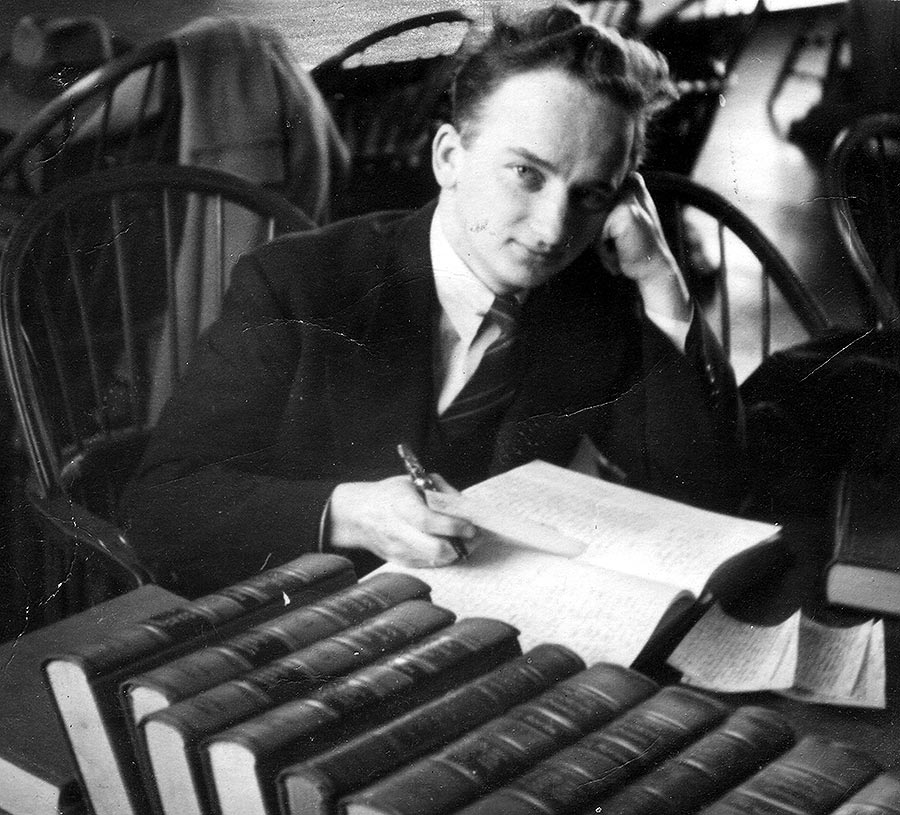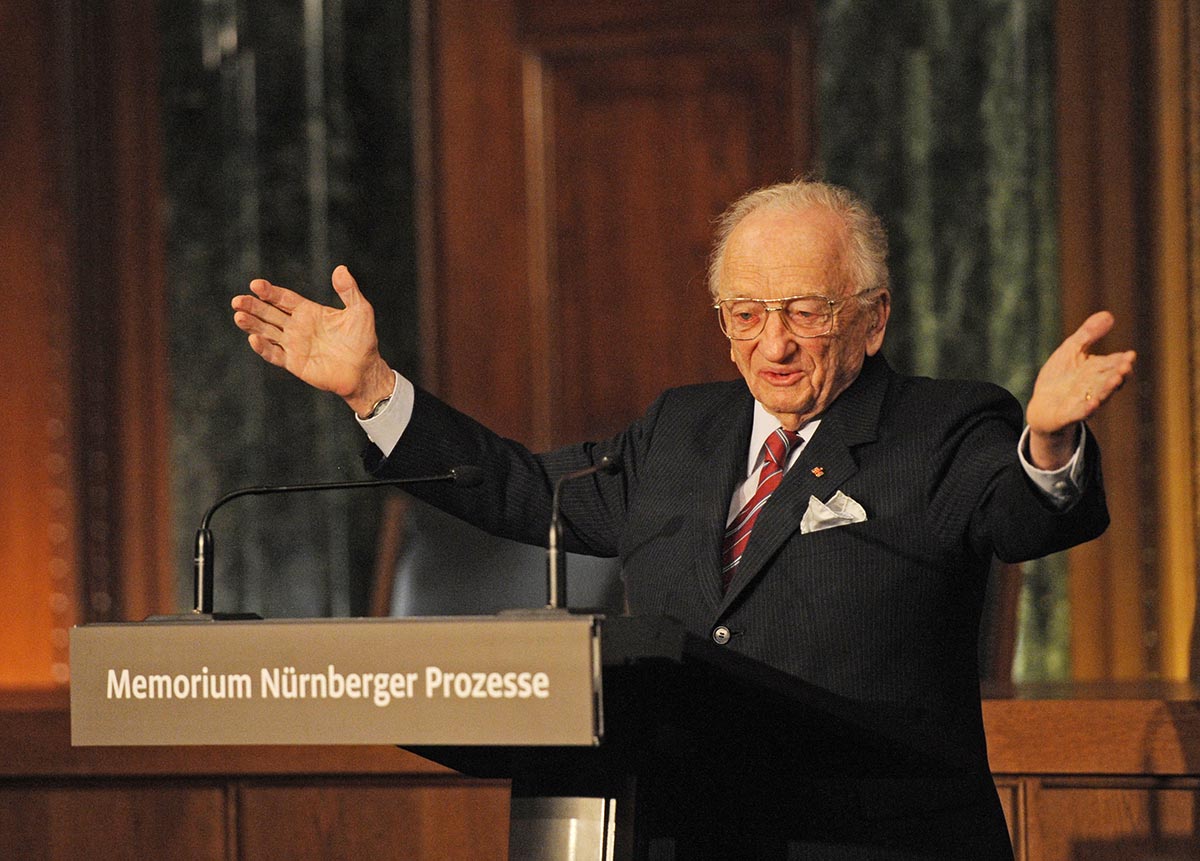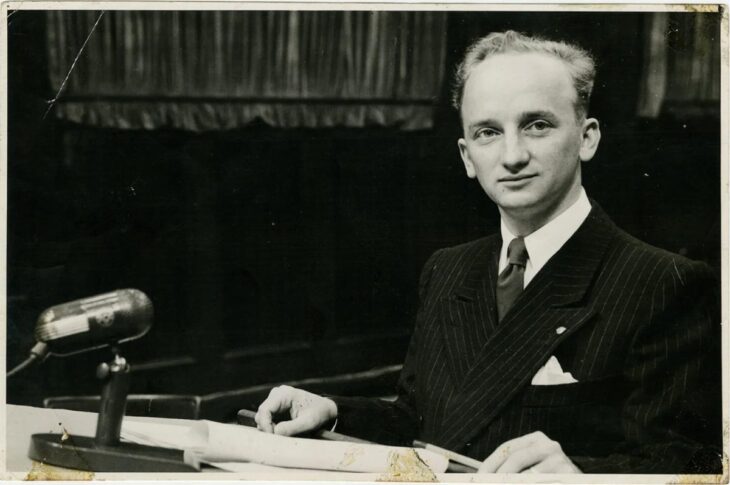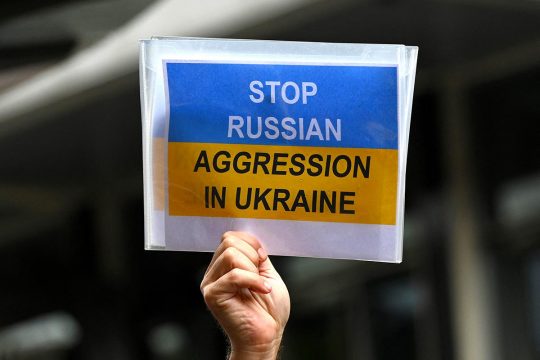Benjamin Berell Ferencz was the last living Nuremberg prosecutor. He passed away during the night of April 7-8, in his 104th year.
Born on March 11, 1920 into a Jewish family, he left Romania at the age of nine months and crossed the Atlantic with his family in the third class of an ocean liner, then lived in a basement in Hell's Kitchen, New York. He combined the American dream with personal determination and was one of the pioneers in the development of contemporary international law.
In his autobiography, he wrote that he learned early on "never to blow out the candle of life until its time has come”. It seemed to his friends that Benny’s “time” would never come, he was "too busy saving the world" as he repeated in recent years. He seemed to have been forgotten by the Fates.
Having miraculously risen from poverty, Ferencz decided, upon receiving his doctorate in law from Harvard, to join the armed forces. In December 1943, he was deployed to England with the 115th Anti-Aircraft Artillery Battalion. On guard duty in the early hours of June 6, 1944, in the extreme south of England, he saw the skies darken with the planes of Operation Overlord.
Ferencz landed at Omaha Beach in Normandy and fought throughout the French campaign, then the Battle of the Ardennes, and went on to Berchtesgaden in Germany.
He wrote that “one of the most gratifying experiences of my life was to feel the gratitude and warmth of the French people who were liberated from German occupation by American troops. (…) It was a heartwarming and emotional demonstration of the value of freedom—which Americans as well as others too often take for granted.”

Investigator and law of war pioneer
In December 1944, he joined the Judge Advocate General's Corps of the Third Army, commanded by General George Patton. Few jurists were under arms at the time, and even fewer had already thought about the law applicable to war criminals. Benjamin Ferencz was one of them, having assisted law professor Sheldon Glueck in 1942 in the writing of articles and two pioneering works, in particular "War Criminals, their prosecution and punishment". A forerunner among legal intellectuals, Ferencz was one of the first investigators working on war crimes, even as the war was still raging. His first investigations concerned the lynching of Allied pilots. He then participated in April 1945 in the liberation of the camps of Ohrdruf and Buchenwald, developing a technique. As soon as he entered a camp, he rushed to the Schreibstube, the camp office, and seized the Totenbücher, the death registers containing the names of the prisoners and the false causes of their death. He seized frightening exhibits, such as two shrunken human heads, which were later produced at Nuremberg. He then moved on to the camps of Flossenberg, Mathausen, Ebensee and Dachau. Then he set out on the trail of art dealers in Bavaria, and finally returned to New York in December 1945.
At the end of the First World War, it was felt that the conflict had been a terrible interruption, but only an interruption, in the historical progress of a reasonable civilization. After the Second World War, it was not at all the same. Ferencz drew from his experience of war a deep determination to try and prevent it. He admitted the potential for the crime to happen again, but considered that only justice could legitimately respond to it. He wrote: “I was keenly aware that there was no way for the scales of justice to balance the murder of more than a million innocent human beings against the lives of two dozen of their executioners. It was my hope that the trial would serve a more useful and enduring purpose; that it might somehow help to deter the repetition of such horrors in the future.”
Benjamin Ferencz, chief prosecutor at 27
Contacted by the entourage of Robert H. Jackson, the US Attorney General at Nuremberg who was looking to strengthen his legal team, Benjamin Ferencz was assigned as a branch chief in Berlin, responsible for gathering evidence. In the spring of 1947, one of his investigators discovered a virtually complete set of secret Gestapo reports in an annex of the Foreign Office. These reports described the daily activities of the Einsatzgruppen, special units that had been liquidating Jews, perceived political opponents and other "undesirables" for two years after the invasion of the Soviet Union on June 22, 1941. Counting the number of executions on a small calculating machine, Ferencz stopped his macabre counting when he got to one million dead. When counting decades later, Ben would still mimic this calculator that must have looked like some kind of one-armed bandit.
He reported his discovery to General Telford Taylor, now chief prosecutor for the American trials at Nuremberg, who realized the importance of this evidence. But any further funding in addition to the Nuremberg trials already planned by the Pentagon was ruled out. When Taylor asked him if he could take on this trial in addition to his original duties, Ferencz became chief prosecutor at age 27 of what became the biggest murder trial in history.
On the first day of the trial, Ferencz echoed Jackson's words from two years earlier at the opening of the Nuremberg trials: "We ask this court to affirm, through international criminal action, the right of man to live in peace and dignity, regardless of race or religion. The case we present here is a call of humanity to the law.” When Benjamin Ferencz told the court that he would prove that the defendants had killed a million people, the impression in the courtroom was that these were vague estimates. The evidence would soon prove otherwise.
Despite the mass of evidence gathered and the thousands of Einsatzgruppen arrested, Ferencz was only able to bring 24 into the courtroom. There was no more room in the dock. He selected the highest-ranking officers, including six generals, and those with the best education from the names that were most frequently mentioned in Gestapo reports. While the evidence against the Einsatzgruppen leaders took only two days to present, the defence took 136 days in court. The court handed down 21 convictions, including 13 sentences of hanging.
“Slight figure and round cherubic face”
The President of the Court, Michael Musmanno, pays tribute to him in his writings: “The active Chief prosecution is young Benjamin Ferencz, graduate of the Harvard Law School, thoroughly at home in the German language and veteran of an American combat outfit which saw active service in Germany. General Taylor assigned this young man to the task of analysing the captured Einsatzgruppen documents, drafting the indictment, locating the accused men in the various prisoner-of-war compounds, selecting assistant trial lawyers, and taking active part in the trial work, generally supervising the entire prosecution”.
“His mammoth preliminary labours having been accomplished (…) He himself undertakes the responsibility of presenting the evidence (…). Benjamin Ferencz is but four feet four inches high and when he stands at the podium his chin barely clears the lectern. Only 27 years of age, his slight figure and round cherubic face make him seem even younger.” [In reality, his height was 160 centimetres].
This impromptu trial became a highlight of the American trials at Nuremberg because of the clarity of the accusation and evidence. As Taylor paid tribute in his writings, the facts and arguments were so simple that this trial was of great importance and dramatic intensity.

After the great trial, the pursuit of reparations
Benjamin Ferencz saw in this founding trial a promise. With Musmanno, he was convinced that - "Wherever the law exists, a court will rise", as the American judge put it. This certainty was to shape Ferencz's thinking and his activity for decades. As "director general" of the Jewish Restitution Successor Organization (JRSO), he set up reparation mechanisms for the victims of Hitler's regime - in particular through the restitution of property, the rescue of precious and religious objects, the re-appropriation of cemeteries, and compensation agreements. The results were mixed. Taylor, in the preface to the book Ferencz wrote about the experience, wrote: “I believe that in time Germany will regret that their industrial leaders did not write a postwar record of generosity instead of the cold and niggardly one revealed in this book”.
A reparations agreement was signed, however, on September 10, 1952, in Luxembourg between West Germany and Israel. German Chancellor Konrad Adenauer borrowed Ferencz's fountain pen for this purpose. Ferencz continued until 1956 to promote reparation mechanisms, which initially amounted to one billion dollars, and more than 50 billion in 2003. After 1956, as a lawyer, he continued to represent the families of victims who did not benefit from these mechanisms, and in particular the victims of medical experiments who were east of the "Iron Curtain”.
But as the United States became bogged down in the war in Vietnam, several former American prosecutors at Nuremberg recalled that the essential lesson of these trials was that anyone, regardless of rank or condition, could be held accountable before an international tribunal. From January 1970 onwards, Ferencz personally undertook a vast research plan aimed at guaranteeing world peace through the criminalization of the crime of aggression. He contributed to the first elaboration of this criminal qualification by the General Assembly of the United Nations, and in December 1974 he published a book that would become a landmark in the history of the legal prohibition of acts of international aggression: "Defining International Aggression: The Search for World Peace".
Since the law was gradually emerging, it was time to create an international court, according to Ferencz. In the early 1990s, he wrote "An International Criminal Court: Step toward World Peace" and this work, which was relayed by several American NGOs, resonated especially after the collapse of Yugoslavia and the Rwandan genocide, when part of the international community called for a shift from policies of stabilization by force to policies of stabilization by law.
Benjamin Ferencz contributed, in Rome, to the conclusion of the treaty creating the International Criminal Court (ICC) in July 1998, and then in Kampala in June 2010 to the formulation of the crime of aggression and its inclusion in the Rome Statute. When the slowness of ratification of this special amendment became obvious, Ferencz first undertook a "tour of the capitals of the rule of law", and then explored new legal avenues, suggesting in particular to use the qualification of crime against humanity to repress acts of aggression.
The repression of this crime of crimes that incorporates all the others became urgent for him. History proved him right, in a striking manner, on February 24, 2022. While the ICC is investigating the conflict in Ukraine but has no jurisdiction over the crime of aggression, will the path suggested ten years ago by Ferencz be explored?
All his life he sought peace through law. He revered a sixteenth-century cartographer, Tycho Brahe, who had begun to map the infinite space of the sky -- in vain, according to his contemporaries. Benjamin Ferencz was one of the pioneers of an even larger space, that of peace and law, where he now rests.
OLIVIER BEAUVALLET
Olivier Beauvallet is a French magistrate, judge of the Extraordinary Chambers in the Courts of Cambodia and judge of the Appeals Chamber of the Special Criminal Court in Bangui, Central African Republic. He has contributed to the dissemination of Benjamin Ferencz's work in French, notably by collaborating on the French edition of his autobiography ("Mémoires de Ben", editions Michalon, 2012) and the publication of several articles by Ferencz in law journals.







